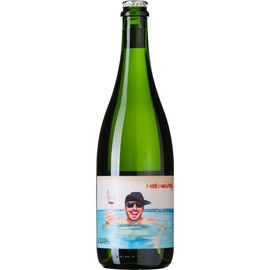Lost in a Field 'Frolic' Pet Nat
- Gift wrapping:
- Options available
- Region:
- UK
- Grape Variety:
- Madeleine Angevine
- Grape Variety:
- Reichensteiner
- Grape Variety:
- Schonburger
- Bottle Size:
- 750ml
- Bottle Size:
- Magnum/1.5L
- ABV:
- 9.5%
- Vintage:
- 2023
This has got to be the wine of the summer! Tiny, tiny production so grab yours whilst you can.
TAMLYN CURRIE on JancisRobinson.com
"Pet-nat king Tim Wildman MW's wine from old vineyards and old German varieties across the country, a number of which he's trying to protect/restore and bring back into production. A blend of 75% Madeleine Angevine (Wildman says it brings tropical fruit, tangerine, flowers) from Kent, 10% Reichensteiner from Herefordshire (brings citrus and acid), a tiny amount of Schönberger (aromatics are beautiful) and the colour from 10% of red varieties, more or less evenly across Rondo, Triomphe and PiWi variety Cabernet Noir from Bee Tree Vineyard. There are also 16 other varieties from lost vineyards but in minute percentages. The story of how he tracked these vineyards down is quite remarkable! Altogether he crushed 3 tons of fruit and made 1,512 bottles and 404 magnums. The fabulously psychedelic, clever, witty label was designed by Brighton artist Nick Burdett, who'd previously done a garden mural for Wildman. The wine is made by Daniel Ham at Offbeat Wines.
"Marmalade orange colour, glowing and slightly hazy like a lava lamp, when poured into the glass the foam is remarkable, pure white and persistent as bubble bath. Explosive aromas of tangerine party jelly - it smells fun! The palate is a riot of satsuma and citrus flavours, there’s crabapple and rhubarb with a refreshing tang of kumquat and a juicy, pulpy, ripe mango texture, like drinking Opal Fruits washed down with Fanta".
The vintage
The vintage 2021 was a challenging year for growing wine grapes in Great Britain. A cool wet summer provided ideal conditions for powdery mildew and botrytis (not the noble kind) and only the most attentive and diligent work in the vineyard ensured a healthy crop. Labour shortages caused by both Brexit and the pandemic exacerbated the situation, leaving many producers short of people to carry out essential vineyard activities during the growing season, including harvest. In addition, increased demand for locally produced wine during lockdown meant that growers who usually sold part of their crop were keeping the fruit for their own brands, leading to limited supply and increased prices for grapes. Finally, wineries were waking up to the fact that aromatic heritage varieties are very well suited to the growing sectors of charmat (English “prosecco”) as well as interesting table wine, putting additional pressure on the varieties we were looking to source. What a year to start!
How it was made
Fruit from their seven vineyards was hand picked between 1st and 14th October 2021, delivered to Off Beat Wines in Wiltshire and gently pressed in their vintage wooden Coquard basket press. The must was transferred to a 1900 litre tank where fermentation began after a week with wild yeasts. After ten days they dropped the temperature of the tank to encourage the wine to become tartrate stable, after which we racked the wine of its gross lees and tartrate crystals, which reduces the risk of the final wine gushing when opened. Fermentation continued slowly as temperatures dropped and the wine was bottled by hand on 12th January 2022 when the residual sugar was around 12 g/ L which would hopefully ferment dry leaving a pressure of around 3 bar. They bottled the wine into 1,514 bottles and 404 one and a half litre magnums. As temperatures rose in the Spring the wine continued to ferment, they tasted samples every month and decided that by early April the wine had successfully fermented and the flavours had transformed from raw juice to wine. April and May were then spent arranging labels and cartons ready for release on June 1st 2022, eight months to the day after the first grapes were picked.











